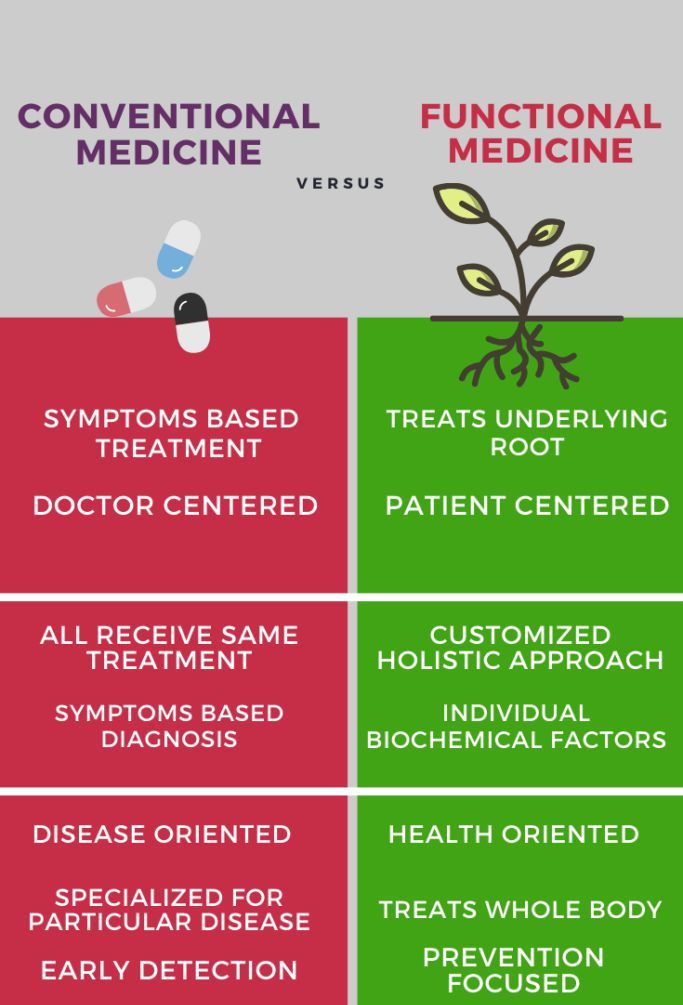Introducing the Healing Strategies of Functional Medicine and Holistic Medicine for Ideal Well-being
The exploration of functional and holistic medicine reveals distinct yet intertwined pathways to health and wellness (Functional Medicine). Functional medicine looks for to reveal the underlying causes of ailments, while all natural medicine welcomes a broader point of view of well-being that includes spiritual and emotional measurements. Together, these strategies provide a structure for people to take cost of their health journeys. This discussion will certainly highlight the principles, practices, and differences in between these modalities, inviting additional factor to consider of their consolidated potential
Recognizing Functional Medicine: Concepts and Practices
Functional medicine represents a standard shift in medical care, emphasizing a patient-centered strategy that seeks to identify and attend to the origin root cause of disease. This design integrates scientific study with scientific experience, seeing patients as one-of-a-kind individuals instead of simple signs of an illness. Specialists of useful medicine use a systems biology perspective, discovering the communications between hereditary, ecological, and lifestyle aspects that add to health outcomes.
Key principles include individualized treatment plans customized to the person's details needs, fostering a collective partnership between patient and practitioner. Functional medicine also focuses on precautionary treatment, concentrating on way of life alterations, nourishment, and stress and anxiety monitoring to support general wellness. This method motivates patients to take an energetic function in their health and wellness, bring about boosted results and a deeper understanding of their conditions. Ultimately, useful medicine intends to restore equilibrium and promote health and wellness, changing the healthcare experience into one of empowerment and holistic recovery.

The Holistic Medicine Approach: Integrating Mind, Body, and Spirit
While lots of healthcare techniques focus entirely on physical signs, all natural medicine stresses the interconnectedness of mind, body, and spirit in the search of perfect health and wellbeing. This integrative technique identifies that emotional and mental elements substantially affect physical health and wellness, leading specialists to contemplate the entire person during treatment. Alternative medicine utilizes diverse strategies, consisting of reflection, lifestyle, and nutrition adjustments, to promote balance and consistency within the person.
Specialists often involve patients in discussions about their emotions, connections, and life experiences, recognizing that these components can affect overall health and wellness. By resolving underlying problems and advertising self-awareness, alternative medicine aims to equip individuals in their healing journey. Holistic Medicine. This paradigm change encourages a proactive method to health, advocating for safety nets and way of living modifications instead than just dealing with symptoms. Inevitably, alternative medicine looks for to grow a much deeper link between body, mind, and spirit, facilitating thorough wellness and personal growth

Key Distinctions In Between Functional and Holistic Medicine
Although both functional and holistic medicine prioritize thorough client care, they vary noticeably in their viewpoints and techniques. Functional medicine highlights a systems-oriented strategy, focusing on identifying and treating the underlying root causes of diseases. Experts commonly make use of advanced diagnostic testing and individualized therapy plans, which may include way of life adjustments, drugs, and supplements to bring back balance within the body's systems.
In comparison, holistic medicine embraces a wider viewpoint, taking into consideration the psychological, spiritual, and environmental variables affecting a client's wellness. It seeks to advertise overall health and wellbeing via a mix of different therapies, such as reflection, acupuncture, and yoga exercise, alongside traditional treatments.

Typical Conditions Treated by Functional and Holistic Medicine
Many people seek both functional and holistic medicine for a variety of usual health and wellness conditions. These strategies are often used to resolve chronic ailments such as diabetes, high blood pressure, and autoimmune conditions (Learn More). Functional medicine focuses on determining underlying causes via thorough assessments, while alternative medicine emphasizes the interconnectedness of the spirit, mind, and body
Psychological health and wellness issues, including stress and anxiety and depression, are also frequently treated within these frameworks, as they think about mental and emotional elements alongside physical symptoms. Additionally, digestive system disorders like short-tempered digestive tract syndrome (IBS) and food level of sensitivities are common worries, with both techniques advocating for dietary modifications and way of living modifications.
Clients might also transform to these methods for conditions such as fatigue syndrome and fibromyalgia, where standard treatments might fail. By integrating various recovery approaches, holistic and practical medicine aim to cultivate general well-being and enhance top quality of life for those affected.
Just how to Select the Right Method for Your Health And Wellness Trip
Exactly how does one identify one of the most ideal wellness technique among the myriad of alternatives readily available? The decision between useful and dig this all natural medicine requires cautious consideration of specific requirements and preferences. One need to assess their wellness objectives, whether they seek signs and symptom alleviation or a much deeper understanding of underlying concerns. Next, evaluating one's case history and present problems can give clarity on which method may be most helpful.
Assessment with medical care professionals experienced in both areas can offer important understandings. Recognizing the concepts of each method-- useful medicine's focus on organic systems and alternative medicine's emphasis overall individual-- can assist in making an informed option. Additionally, taking into consideration individual values and convenience with treatment modalities, such as alternate therapies or nutritional adjustments, is necessary. Eventually, a customized technique that lines up with one's lifestyle and beliefs will certainly cultivate a more efficient wellness trip.
Regularly Asked Inquiries
Are Functional and Holistic Medicine Covered by Insurance Coverage Plans?
Insurance policy protection for alternative and practical medicine varies significantly by strategy and supplier - Learn More. Some insurance provider may provide partial reimbursement, while others do not cover these different strategies whatsoever, calling for out-of-pocket payments from patients
For How Long Does Therapy Usually Absorb These Approaches?
Treatment duration in holistic and functional medicine varies widely, often varying from a couple of weeks to several months. Aspects affecting this include specific wellness conditions, therapy strategies, and the client's dedication to way of living adjustments.
Can I Incorporate Functional and Holistic Medicine With Standard Treatments?
Yes, individuals can combine alternative and useful medicine with traditional treatments. This integrative strategy may boost general wellness, however speaking with healthcare companies is vital to guarantee safety and security and efficiency in handling therapy plans.
What Credentials Should Experts of These Approaches Have?
Professionals of alternative and practical medicine need to have appropriate degrees in medicine or health sciences, alongside specialized training in their corresponding fields - Learn More. Accreditations from identified organizations enhance reputation and assurance adherence to established criteria of treatment
Exist Certain Diets Advised in Functional or Holistic Medicine?

In alternative and functional medicine, specific diets usually consist of entire foods, plant-based options, and removal diet regimens tailored to private requirements. Emphasis lies on nutrient thickness and preventing processed foods to boost overall wellness and health and wellbeing.
Functional medicine seeks to uncover the underlying causes of conditions, while holistic medicine welcomes a wider perspective of wellness that includes spiritual and emotional measurements. While useful medicine is much more clinically oriented, stressing biological processes, alternative medicine emphasizes the interconnectedness of different life aspects. Several patients look for both practical and holistic medicine for a variety of typical health and wellness conditions. Comprehending the principles of each method-- practical medicine's emphasis on biological systems and all natural medicine's emphasis on the whole person-- can help in making an informed option. Professionals of alternative and useful medicine ought to have relevant levels in medicine or health scientific researches, alongside specialized training in their corresponding areas.